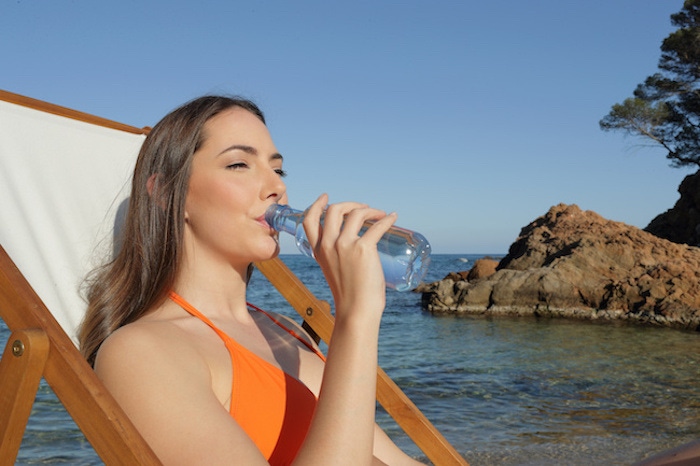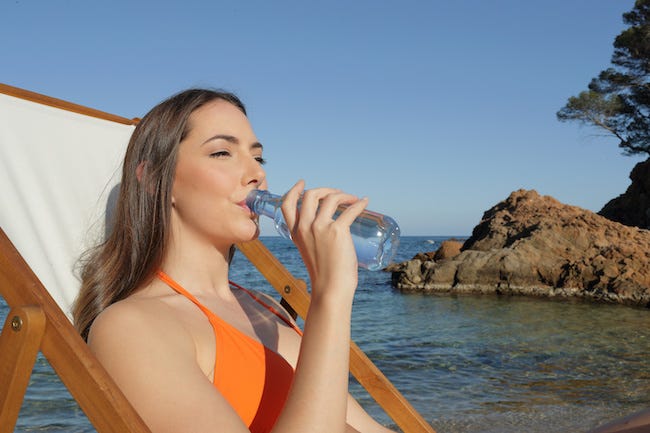The consumption of bottled water, soft drinks, and on-the-go food products, all of which use PET-based packaging, typically rises as warmer weather envelops Europe and people go on vacation. This year will be different.
June 25, 2020

Polyethylene terephthalate (PET) is the most commonly used plastic to package bottled water, soft drinks, and on-the-go food products, and demand for those products tends to follow a cyclical, fairly predictable pattern. For example, as temperatures begin to rise and the European summer holiday season begins, the demand for PET resin increases, writes Susan Mair, Petrochemical Analyst at Independent Commodity Intelligence Services (ICIS), in a recent article. Bottled water and soft drink sales rise as warmer weather moves across the continent, she notes, and travelers typically eschew tap water when they are abroad, causing sales of bottled water to soar in holiday destinations. None of that is likely to happen this year as a result of the COVID-19 pandemic and consequent shelter-in-place and lockdown measures. “2020 is guaranteed to be a turbulent year for most markets, and PET resin is not exempt,” writes Mair.
|
The absence of a "normal" holiday season in Europe this year will reduce demand for PET, typically used to package bottled water and soft drinks. Image: Antonioguillem/Adobe Stock. |
When lockdowns were broadly implemented across Europe in March, PET initially benefited, as people stocked up on food, beverages, and household products. “PET resin price initially remained afloat against a backdrop of crashing crude oil and plummeting feedstock costs,” according to Mair. By April, however, widespread quarantine measures and travel restrictions took a toll. Weakened downstream demand and declining feedstock prices filtered into the European PET resin price, writes Mair. Uncertainty surrounding summer vacations and the steep drop in air travel will further exacerbate the decline in consumption of PET-packaged products. “With tourism being significantly reduced since mid-March it is almost inevitable that there will be no ‘normal’ holiday season in 2020. PET resin demand is expected to be reduced year on year in tourist heavy areas in 2020.”
An interesting side note is the impact this will have on individual countries and recycling. According to ICIS data, someone who spends a night at a tourist accommodation can be presumed to consume three PET-packaged beverages per day. Hence, countries that see a substantial rise in tourism in a normal year — Spain, Greece, Italy, Portugal, Croatia, and Malta, for example — will see a decline in demand for PET resin compared with 2019, according to Mair. Conversely, countries that are expected to experience significant domestic tourism and “staycations” — Netherlands, Belgium, Germany, and Denmark, according to ICIS — will see a sizable return in PET demand. And this will have an impact on recycling rates.
“Any decline in beverage consumption is a reduction in bottles available for collection," writes Mair. Meanwhile, staycations result in elevated domestic consumption. “This suggests that those countries which operate collection systems that typically produce the highest collection rates will increase the volumes collected, such as Germany and those with deposit return schemes.”
Nevertheless, overall European sustainability goals will be almost impossible to reach in 2020. In 2018, the recovery rate of PET bottles in Europe was 63%, according to ICIS data. The pre-pandemic growth rate in 2020/2021 was projected to be approximately 3% per year. But ICIS analysis shows that in order to meet the recovery targets of the Single Use Plastics directive, the growth rate in recovery would need to approach 7% per year, according to Mair. “Collection and sorting are not only the first stage of the recycling chain but the most critical,” she added. "Without the necessary quantity and quality of bales, or feedstock, the supply chain cannot produce the [recycled] PET product required to meet the high level of demand now and in the future."
About the Author(s)
You May Also Like




